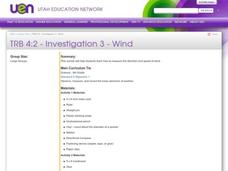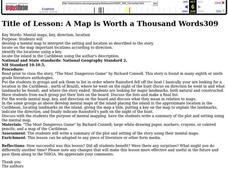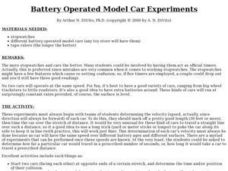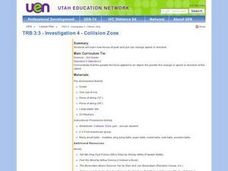Curated OER
Classify Forces
Third graders compare and contrast the forces of pushing and pulling. As a class, they take a field trip around the school and write down any action they see and any object that is motionless. In groups, they use magazines to cut out...
Curated OER
Wind
Fourth graders are read a story and answer the comprehension questions about sound and wind. In groups, they make their own wind vane and how to determine the direction of the wind. To end the lesson plan, they make their own Anemometer...
Curated OER
A Map is Worth a Thousand Words
Students read the story, "The Most Dangerous Game," by Richard Connell. They discuss specific parts of the story with a group and put their lists on the board. They write a summary of the plot and setting of the story.
Curated OER
Vectors
Learners use both magnitude and direction to locate a place. They use locating techniques to make a temperature field of their classroom.
Curated OER
Battery Operated Model Car Experiments
Students time battery operated cars over a set track and determine the velocity of each type of car. They use the cars as manipulatives to demonstrate word problems involving velocity.
Curated OER
Investigation 4 - Collision Zone
Third graders study how forces of push and pull can change speed or direction.
Science Buddies
Science Buddies: Project Ideas: Using Plants to Determine Direction
Don't get lost in the woods. In this plant biology science fair project, students will investigate whether the location of moss growth on trees is a good way to determine cardinal direction. The Science Buddies project ideas are set up...
Science Education Resource Center at Carleton College
Serc: Orienteering With Vectors
An activity where students use their knowledge of vectors to create orienteering directions for their fellow classmates to follow. The directions must contain at least 6 checkpoints and the final checkpoint includes a prize!
BioEd Online
Bio Ed Online: Balloon Blast
In the following instructional activity students are asked to devise a plan to measure the distance of a balloon's flight, predict the direction a balloon will travel as it deflates, learn about Newton's Laws of Motion, experience...
American Association of Physics Teachers
Com Padre Digital Library: Open Source Physics: Vector Components Model
An interactive java applet model allows students to explore vectors. Students can practice finding the direction and magnitude of a vector given its x and y-components as well as practice finding the x and y-components given a vector's...
American Association of Physics Teachers
Com Padre Digital Library: Open Source Physics: Vector Addition Model
This Java applet simulation explores vector addition of two vectors in two dimensions. Given the magnitude and direction, students must determine the vector components.
Other
Childu: Compass:over the Edge
Do you know what a 'compass rose' is? Follow this interactive animation to learn how to use a magnetic compass properly. Easy to understand; aimed for younger students.
TeachEngineering
Teach Engineering: Classroom Triangles
In this activity, students will use bearing measurements to triangulate and determine objects' locations. Working in teams of two or three, students must put on their investigative hats as they take bearing measurements to specified...
Science Education Resource Center at Carleton College
Serc: Investigating Motion With Marbles
For this guided inquiry activity, students will use 2 marbles of different size and a box to investigate what makes the marbles move and what will cause the marbles to change speed and direction.
PBS
Pbs Kids: Where's Buster?: A u.s. Geography Game About the States
Develop map and directional skills as well as skills in following a series of clues to find which U.S. state Buster is in.
The Wonder of Science
The Wonder of Science: K Ps2 1: Pushes, Pulls, and Motion
Teaching students about pushes, pulls, and motion? Use this site to plan lessons for students to conduct investigations to compare the effects on the motion of an object when pushes or pulls come from different directions or strengths.
The Wonder of Science
The Wonder of Science: K Ps2 2: Motion Design Solution
The NSTA vetted source includes resources to teach how to analyze data to determine if a design solution works as intended to change the speed or direction of an object with a push or a pull. Included are assessment ideas, videos,...
Utah Education Network
Uen: Going Places
First graders will become familiar with a variety of directional words.
Utah Education Network
Uen: May the Best Force Win
The greater the force applied to an object, the greater the change in speed or direction of the object.
Utah Education Network
Uen: Trb 3:3 Investigation 4 Collision Zone
Learn how forces of push and pull can change speed or direction.
E-learning for Kids
E Learning for Kids: Science: Antarctica: What Is Position and Reference Point?
With all the snow and ice in Antarctica, it's easy to get lost. Help Tim find his way using a map and a compass.
E-learning for Kids
E Learning for Kids: Science: Antarctica: Penguins: What Is Motion?
What do you know about Emperor penguins? Ernie is researching them and their migration across the continent.
Science Education Resource Center at Carleton College
Serc: Understanding Vectors Vector Addition
By participating in a group activity, students will learn how to add force vectors. They will see the significance of direction when adding vector quantities.






















